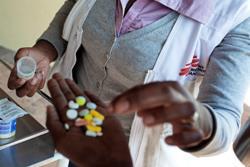Drinking, smoking and diabetes don’t mix


Sibusiso Ngobeni spent years battling alcoholism. He recently started taking treatment for type 2 diabetes following years of false starts.
“I remember when the symptoms first appeared my boss nephew took me to his doctor,” says Ngobeni, who was prescribed diabetes medication. “I drank the treatment for a few days and stopped because I wasn’t getting better as expected, and continue drinking and smoking.”
“I am a drinker and always have been,” he tells OurHealth. “I used to say I’d rather spend time in a shebeen drinking alcohol and smoking than drinking pills every day but now I rather put my health first.”
Type 2 diabetes is a chronic condition in which a person’s body either does not produce enough insulin to control blood sugar levels or resists the hormone that regulates blood sugar, according to the US health non-profit the Mayo Clinic.
Once thought to be restricted to adults, the incidence of type 2 diabetes in children has soared globally with increased childhood obesity. Symptoms come on slowly and can include increased thirst and urination, weight loss and blurred visions, according to the Mayo Clinic.[quote float= right]“My stubbornness and ignorance is the reason why I am in this situation and I regret wasting time”
People living with diabetes are at an increased risk for a number of conditions including tuberculosis, as well as problems of the heart, kidneys and eyes and are advised to quit smoking and drink in moderation.
The Mayo Clinic advises that men under the age of 65 years old like Ngobeni consume no more than two alcoholic drinks daily. The non-profit also cautions diabetics on insulin to check their blood sugar levels before going to sleep after drinking to ensure that levels do not dip to levels low enough to induce a coma.
Although Ngobeni has started treatment and curbed his drinking, he battles wounds on his feet common among patients who have gone through long bouts of uncontrolled diabetes.
“I am weak and the wound on my feet has made it difficult to continue doing so,” he says. “Now to walk and stand up on my own without holding to something is a struggle on its own.”
“My stubbornness and ignorance is the reason why I am in this situation,” he adds. “I regret wasting time because if I only continued with my doctor early I wouldn’t be this sick. “
About 10 percent of South Africans are living with diabetes, according to the Centre for Diabetes and Endocrinology in Johannesburg.
Author
Republish this article
This work is licensed under a Creative Commons Attribution-NoDerivatives 4.0 International License.
Unless otherwise noted, you can republish our articles for free under a Creative Commons license. Here’s what you need to know:
You have to credit Health-e News. In the byline, we prefer “Author Name, Publication.” At the top of the text of your story, include a line that reads: “This story was originally published by Health-e News.” You must link the word “Health-e News” to the original URL of the story.
You must include all of the links from our story, including our newsletter sign up link.
If you use canonical metadata, please use the Health-e News URL. For more information about canonical metadata, click here.
You can’t edit our material, except to reflect relative changes in time, location and editorial style. (For example, “yesterday” can be changed to “last week”)
You have no rights to sell, license, syndicate, or otherwise represent yourself as the authorized owner of our material to any third parties. This means that you cannot actively publish or submit our work for syndication to third party platforms or apps like Apple News or Google News. Health-e News understands that publishers cannot fully control when certain third parties automatically summarise or crawl content from publishers’ own sites.
You can’t republish our material wholesale, or automatically; you need to select stories to be republished individually.
If you share republished stories on social media, we’d appreciate being tagged in your posts. You can find us on Twitter @HealthENews, Instagram @healthenews, and Facebook Health-e News Service.
You can grab HTML code for our stories easily. Click on the Creative Commons logo on our stories. You’ll find it with the other share buttons.
If you have any other questions, contact info@health-e.org.za.
Drinking, smoking and diabetes don’t mix
by cynthiamaseko, Health-e News
May 29, 2015



